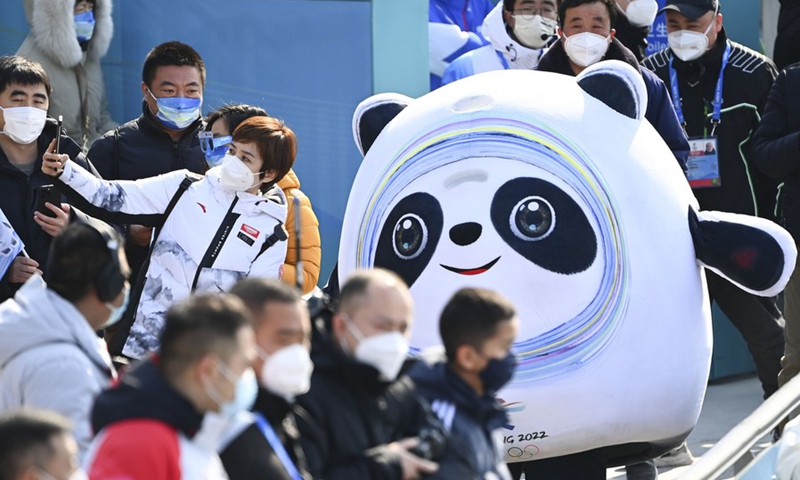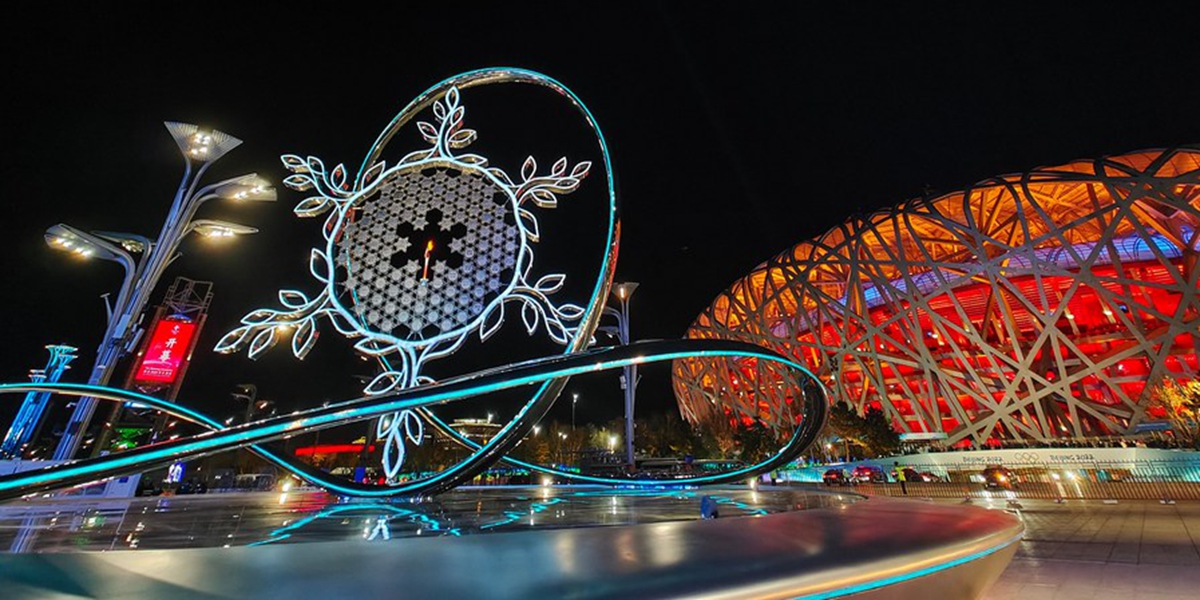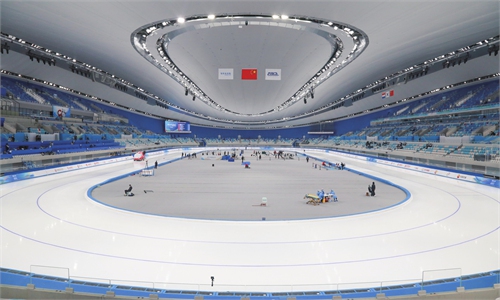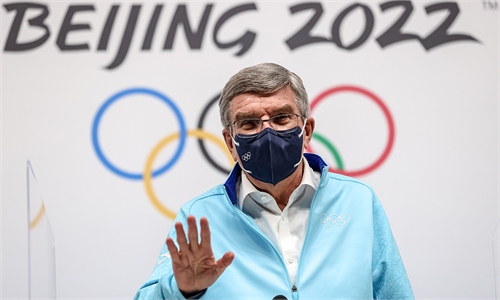Bravo to China and the IOC for creating a safe environment for the world's greatest athletes: US Olympic strategist

An audience takes selfies with Bing Dwen Dwen, the mascot of Beijing 2022 Olympic Winter Games, during the freestyle skiing men's freeski big air final at Big Air Shougang in Beijing, capital of China, Feb. 9, 2022. Photo: Xinhua
Editor's Note:
Gerge Hirthler has served as a lead writer or senior communications strategist on 10 international Olympic bid campaigns, including the 2008 Beijing Games. With the Beijing 2022 Winter Olympic Games in the home stretch, how should we evaluate China and IOC's efforts? What impression has the event left on people? Hirthler shared his views in a written interview with the Global Times reporters Yu jincui, Li Aixin and Bai Yunyi.
GT: In a previous interview, you mentioned, when China was bidding for the 2008 Games, China wanted to show its desire to go global and participate in the international community. What do you think is different when it comes to the 2022 Games? In your opinion, how has China's status and role changed in the global arena?
Hirthler: The outside world really doesn't understand China. Western media presents an image of the country as a totalitarian state that is often viewed as a threat to world peace. We seldom hear of the achievements of China, but if you look at its history over the last 40 years - since Deng Xiaoping launched his market reforms - you have to acknowledge its rise from an agrarian nation to a superpower of global trade as one of the most remarkable transformations in modern times.
And I see the Olympic Games - both the 2008 Summer Games and the 2022 Winter Games - as China seizing on the opportunity to present its progress to the world, not in an aggressive threatening mode of expansionism, but rather as an offer of hospitality for the world's greatest athletes even in times of great stress and medical emergencies.
We may not agree with the political system deployed by the People's Republic of China, but a little comparative perspective may suggest that China is doing a rather skillful job of managing progress within its society. The COVID pandemic, for example, reveals stark comparisons to the United States.

The cauldron is lit outside the National Stadium during the opening ceremony of the Beijing 2022 Olympic Winter Games in Beijing, capital of China, Feb. 4, 2022. Photo: Xinhua
GT: China has been focusing on delivering an Olympics in 2022 with a "green, inclusive, open and clean" approach. So far, has any aspect of these concepts left a deep impression on you?
Hirthler: Having first visited Beijing and the mountains to the north in 2000, I remember the infamous smog that hung over the city continually, particularly in the winter when the factories around Beijing were operating at full production and millions of people were heating their homes with coal fires. The smog was invasive and many of my friends, who had grown up in that polluted air, suffered from an annoying condition they called the "Beijing cough."
As part of the 2008 bid, China implemented a $12 billion program to relocate many of its factories away from the city and impose pollution reduction methods on their manufacturing processes. At the time, as part of the Olympic campaign in the build-up to the Games, the government began a sweeping conversion effort to move individual apartments and homes from coal-burning to natural gas. Taken together, these initiatives began to have a clear impact on the quality of air in Beijing even during the years when I was working there.
Today, watching the Games on TV and knowing the extraordinary number of new "green initiatives" and environmental measures China has implemented for the Winter Games - under the IOC's demanding sustainability guidelines - I am struck by how clear the air is and how clean the settings appear. The blue skies are indeed symbolic of the immense environmental changes China has made to improve the quality of life for its people. The good news is that these Olympic-driven environmental changes will not simply serve the visitors who arrive for the 17 days of the Games, but will help improve the health of generations of Chinese to come.
And the benefits of China's Olympic-driven environmentalism reach well beyond the borders of the country. Today, China is the global leader in the development of green economy decarbonization for the planet. China ranks as a leading investor in low-carbon technologies and solar panels - initiatives that are driving the development of the green economy worldwide. If you look at the roots of those beneficial international trends, you might discover that it was the Olympic Games that ignited China's sustainable development overall.
GT: You have previously noted that the 2022 Games will further strengthen the belief that the Olympic Games can be held safely during an epidemic. Would you like to talk about why are you confident in this regard for the 2022 Games in Beijing? Is there any difference that you have noticed between Beijing and Tokyo in terms of epidemic prevention and control?
Hirthler: With the 2022 Winter Olympic Games now halfway over and heading down the homestretch, it is clear that China developed a medically safe system - a closed-loop bubble - that made it possible to host the Games without any serious threat of infection to the external population. I noted a few reports Tuesday that there were no new infections reported in airport arrivals and that within the closed-loop there was only one positive result from more than 60,000 tests. So, I'd say, bravo to China and the IOC for creating a system of health-care security that empowered the world's greatest winter athletes to chase their dreams before a watching world.
The euphoric joy we've witnessed on the faces of the athletes who have succeeded in winning medals in Beijing is no less "infectious" than the joys expressed by Olympic champions throughout history. Despite the fact that they're competing before reduced crowds of spectators and don't have the usual entourages of family and friends right there with them, this generation of new Olympians isn't complaining about the life in the bubble - they're openly and exuberantly expressing their pleasure in having a chance to compete on the global stage.

Gerge Hirthler Photo: Courtesy of Hirthler
GT: This time, the Olympic Games also face some "diplomatic boycotts." The Games are highly politicized if held in a country considered hostile by the US, with the sponsors under pressure and the IOC, even athletes, asked to take a stand on certain issues. How do you see this trend?Hirthler: I'm sure this trend will increase, driven by the political agendas of actors on the national and international scene who recognize they can exploit the intense worldwide media focus on the Olympic Games to gain exposure for their issues, causes and criticisms, particularly when they want to find fault with the ideology or political position of the host country or wish to attack the IOC as a corrupt, immoral institution, which it is not. Few of the critics of the Olympic Movement actually know the IOC members and don't understand their motivations or the nature of the enterprise, which is to strengthen sport globally, foster an appreciation for the values of human excellence, friendship and respect in young people everywhere and celebrate the diversity of humanity while bringing the world together in friendship and peace through sport.
They dismiss the idea that these values are actually upheld in the Games or in the practice of the Olympic Movement and often criticize it as a capitalist tool designed to enrich its leadership or support the hegemony of the Western powers. They typically base their criticisms on generalizations based on stereotypical media coverage of the Olympic scandals produced by a few bad apples of the past. They ignore the reforms that have been implemented in the last decade and deride the notion that the Games symbolize hope for a better world for all of us.
Those who want the IOC to award the Games only to countries that conform to a certain political system or ideological standard do not understand the mission of the Olympic Movement or its ultimate value to our world. The modern Olympic Movement was founded to unite the world across all the borders that divide us regardless of our differences in the political, economic, social, cultural or religious realms. The fact that the IOC possesses full autonomy - its members are recruited, not appointed so their primary allegiance is to the Olympic Movement and sport, not their country or any other endorsing group - empowers it to find ways of fulfilling its mission by taking the Games to places that would be precluded by a democratic political framework. The independence of the IOC - the very thing so many criticizes today - gives it a unique value in our modern world. Because of its independence and autonomy, it is free of the political constraints that would prevent it from bringing the world together regardless of the differences that divide us nationally, religiously, ethnically, ideologically, etc.
GT: Chinese leaders have been stressing that "one's word shall be kept at all costs." Despite the impact of the epidemic, China is still fulfilling its solemn commitments to the world. How do you evaluate China's sincerity in preparing for the Winter Olympics? By organizing the Olympic Games, what kind of national image do you think China has conveyed?
Hirthler: China has done the world a great service in keeping its word and its commitments in hosting the Games. The success of Beijing 2022 will serve to strengthen the Olympic Movement as it emerges from the pandemic - just as Tokyo 2020 did. Despite the controversies and the threat of the pandemic, China and Japan stood strong and found ways, with their partners at the IOC, to ensure the Olympic Movement could continue uninterrupted on its path to building a better world through sport.



